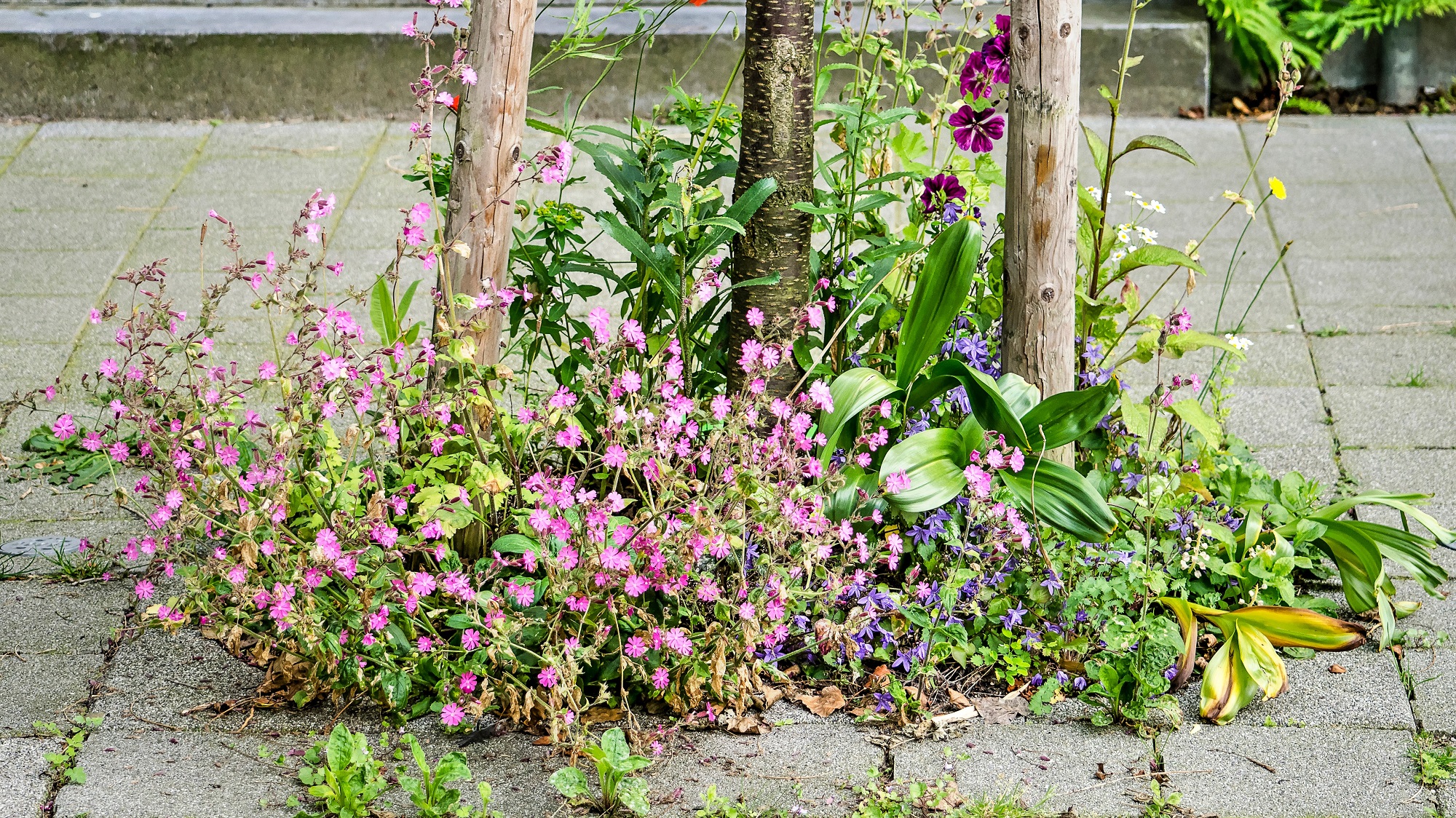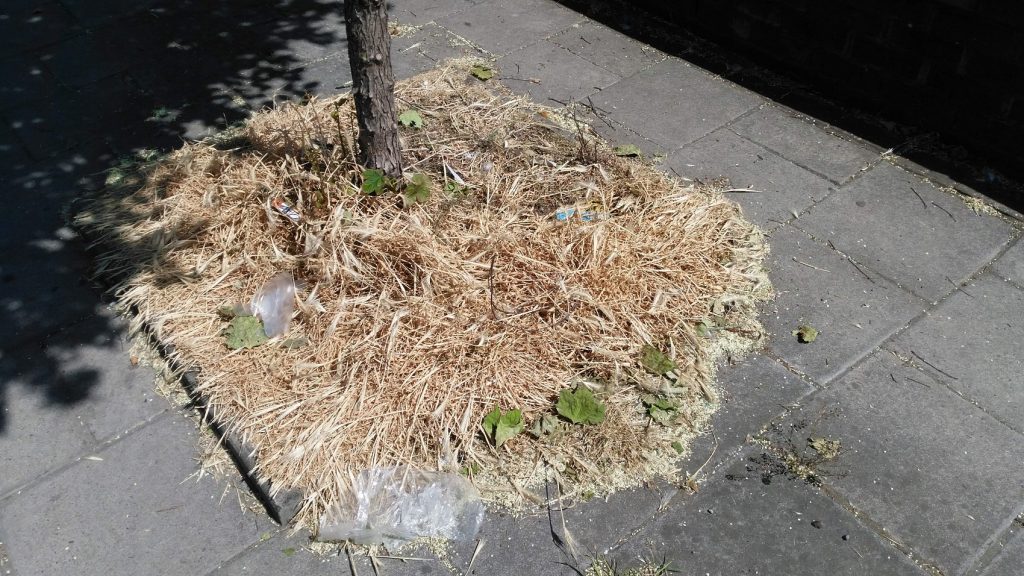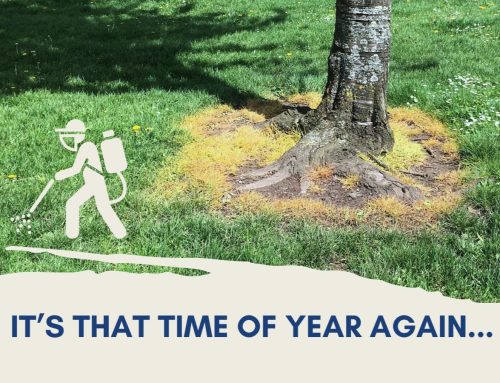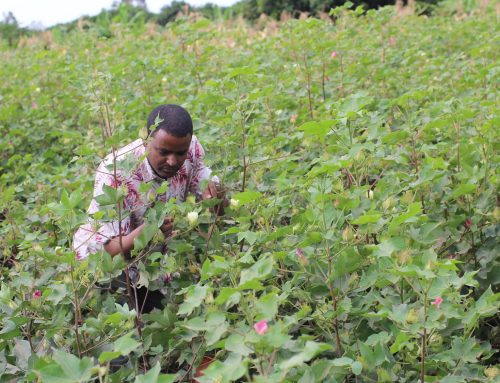by Emma Pavans de Ceccatty, Campaigner, PAN UK
A report released by PAN Europe earlier this year ‘Pesticide Free Towns: A Diversity of European Approaches’ shows that many of our European neighbours have been making great progress towards banning the use of pesticides in public urban spaces.
Luxembourg and France have passed total bans on all non-agricultural pesticides, which includes those used in private gardens as well as in urban public spaces such as pavements, playgrounds, green spaces, cemeteries, sports facilities, allotments and more. Denmark has also banned pesticides on paved surfaces, parks and other green areas, sports fields and golf courses. In Belgium non-licensed individuals, such as amateur gardeners, are no longer allowed to use glyphosate. Glyphosate is the world’s most widely used weedkiller and generally the main chemical used in urban centres all around the world.

Wild flowers left to grow in a tree pit on the pavement
In an exciting development, there is now a chance that the European Union may follow France’s example and introduce a complete ban on using pesticides in towns and cities as part of an overall goal to reduce pesticide use by 50% by 2030. The proposal, which is part of the EU’s “Farm to Fork” initiative states: “The use of all pesticides will be prohibited in places such as urban green areas, including public parks or gardens, playgrounds, schools, recreation or sports grounds, public paths and protected areas […]. This new rule will remove chemical pesticides from our proximity in our everyday lives.”
Perhaps the grass really is greener on the other side of the proverbial fence! Our neighbouring countries appear to have banished pesticides from their towns and cities without any issues or major breakdowns in infrastructure. And yet the UK still lags behind.
What is the situation in the UK?
Many UK councils have taken it upon themselves to go pesticide-free, but there is no national ban on using pesticides in our urban areas. Glyphosate remains approved for use until at least 2025.
We are still waiting to see a draft of the long overdue UK National Action Plan on the Sustainable Use of Pesticides (NAP) which was promised in 2018. Rumour has it that a previous draft may have included a recommendation to end the use of urban pesticides, but this seems unlikely under the current leadership at the Department for Environment and Rural Affairs (Defra).
While the EU relicensed glyphosate for an additional five years in 2017, it only passed narrowly with many Member States voting to remove it from the market to better protect human health and the environment. It was reapproved with the condition that European Member States “minimize the use in public spaces, such as parks, public playgrounds and gardens.” Despite this, the UK Government and many local councils continue to tout the EU license as proof that this chemical is ‘safe’, when that is far from the truth.

Tree pits in Lambeth sprayed with glyphosate – thanks to campaigning this will no longer take place. Credit: Janie Bickersteth
The EU Directive on Sustainable Use of Pesticides (SUD), adopted by the European Union, while the UK was still a Member State, also states that “In other places such as public parks and gardens, sports and recreation grounds, school grounds and children’s playgrounds, and in the close vicinity of healthcare facilities, the risks from exposure to pesticides are high. In these areas, the use of pesticides should be minimised or prohibited. When pesticides are used, appropriate risk management measures should be established and low-risk pesticides as well as biological control measures should be considered in the first place.” And yet, most UK councils continue to spray pesticides around schools and hospitals and other areas frequented by children and other vulnerable groups, with little or no notice.
There is a glimmer of hope in the shape of the UK’s relatively new Environment Act. Passed in 2021, the Act makes it clear that Local Authorities now have a “General duty to conserve and enhance biodiversity“, and also advocates for “Local nature recovery strategies for England“. While the Act doesn’t reference pesticides specifically, the links between biodiversity declines and pesticides are clear. Having measures in place to boost biodiversity which don’t tackle pesticides are likely to fail. If councils have a duty to help nature recover, surely not using weedkillers must be part of this transition.
Tackling the issue at the root by making progress locally
PAN Europe determined that pressure from grassroots activists was absolutely critical in persuading national governments to ban urban pesticides. The experience of other countries shows that when enough local areas go pesticide-free it forces the national government to re-evaluate its own position on the issue.
As it stands, more than 96 UK councils of varying sizes have either banned or are well on their way to banning pesticides. The list includes Birmingham, the largest council in the UK, which is making great progress, as well as many London boroughs. Change is possible!
You can find out more and join the Pesticide-Free Towns campaign here.





